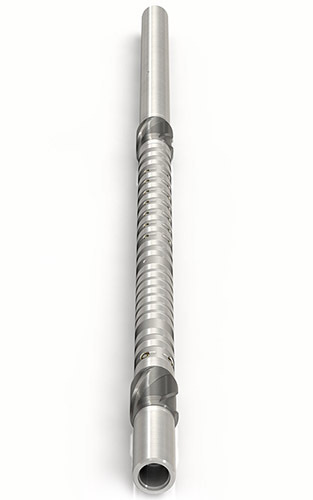 Search
Search
 Search
Search

XBAT™ Service provides real-time cement assessments for accurate top of cement evaluations
Download PDFDeep Water

Provide an assessment of top of cement (TOC)
Gulf of Mexico
Acoustic logging-while-drilling (LWD) tools can be used to provide an assessment of top of cement (TOC), offering an alternative to a conventional wireline cement bond log (CBL) or segmented bond tool (SBT). During the cementing of a 7 5⁄8-inch liner inside a 9 5⁄8-inch liner in an ultra-deepwater Gulf of Mexico well, the operator observed full returns resulting in a calculated TOC at X7,501 feet. The operator wanted to validate the use of the acoustic LWD tool to provide real-time cement assessment while logging at normal tripping speeds, and to enable a quick decision on a potential wireline SBT logging run.
The XBAT azimuthal sonic and ultrasonic LWD service was included in the cleanout assembly and was used to log inside the 7 5⁄8-inch liner five days after the cement job. The LWD data provided a clear indication of cement below and above the overlap between the 7 5⁄8-inch liner and the 9 5⁄8-inch liner, with TOC observed at approximately X7,500 feet.
A wireline SBT log was run approximately nine days after the cement job with the intervalin the 7 5⁄8-inch to 9 5⁄8-inch liner from X7,490 to X8,134 feet, indicating a free pipe response, making it difficult to estimate TOC. Analysis of the cement using wireline data only would have been difficult; however, due to the clear indication of TOC from the LWD data, the combined LWD and wireline cement evaluation results complemented each other.
“We had over-displaced our cement job on the 9 5⁄8-inch expandable liner, leaving what we believed was no cement behind the shoe. Fortunately, the previous shoe had enough strength for us to drill ahead without a squeeze, so we did. We TD’d, then ran a 7 5⁄8-inch production liner and pumped a textbook primary job – no losses, rotation throughout, etc. We were confident that cement was placed where we intended. We ran in with the LWD sonic tool during the cleanout/displacement run. In this case, we displaced from 8.3-ppg SBM to 8.6-ppg seawater (no micro-annulus concern with lighter fluid). The real-time option was deployed as a proof of concept. The real-time LWD sonic data showed that TOC was at 7,540 feet (2298 meters). This was confirmed by the memory data. We then ran an SBT log on wireline. The SBT showed good-quality cement behind the 7 5⁄8-inch pipe in open hole, but showed a very weak response across the 7 5⁄8-inch pipe that was inside of the un-cemented 9 5⁄8-inch SET. Had we not had the TOC data very clearly from the LWD sonic data, we would not have been able to call TOC where it was, bt rather would have likely called it below the 9 5⁄8-in. shoe. This would have led us to ask BSEE for permission to continue or to perform a C-flex squeeze (which would not have been successful since it was cemented up). We again avoided a potential 1.5 days/USD 700,000 for squeeze work.”
days saved
USD Saved
Feet (2298 meters) of TOC

Gather real-time, high-quality data while drilling for improved subsurface insight, increased ROP, and enhanced wellbore stability.

Reliable azimuthal sonic and ultrasonic data for optimized drilling, enhanced well placement, and comprehensive evaluation.